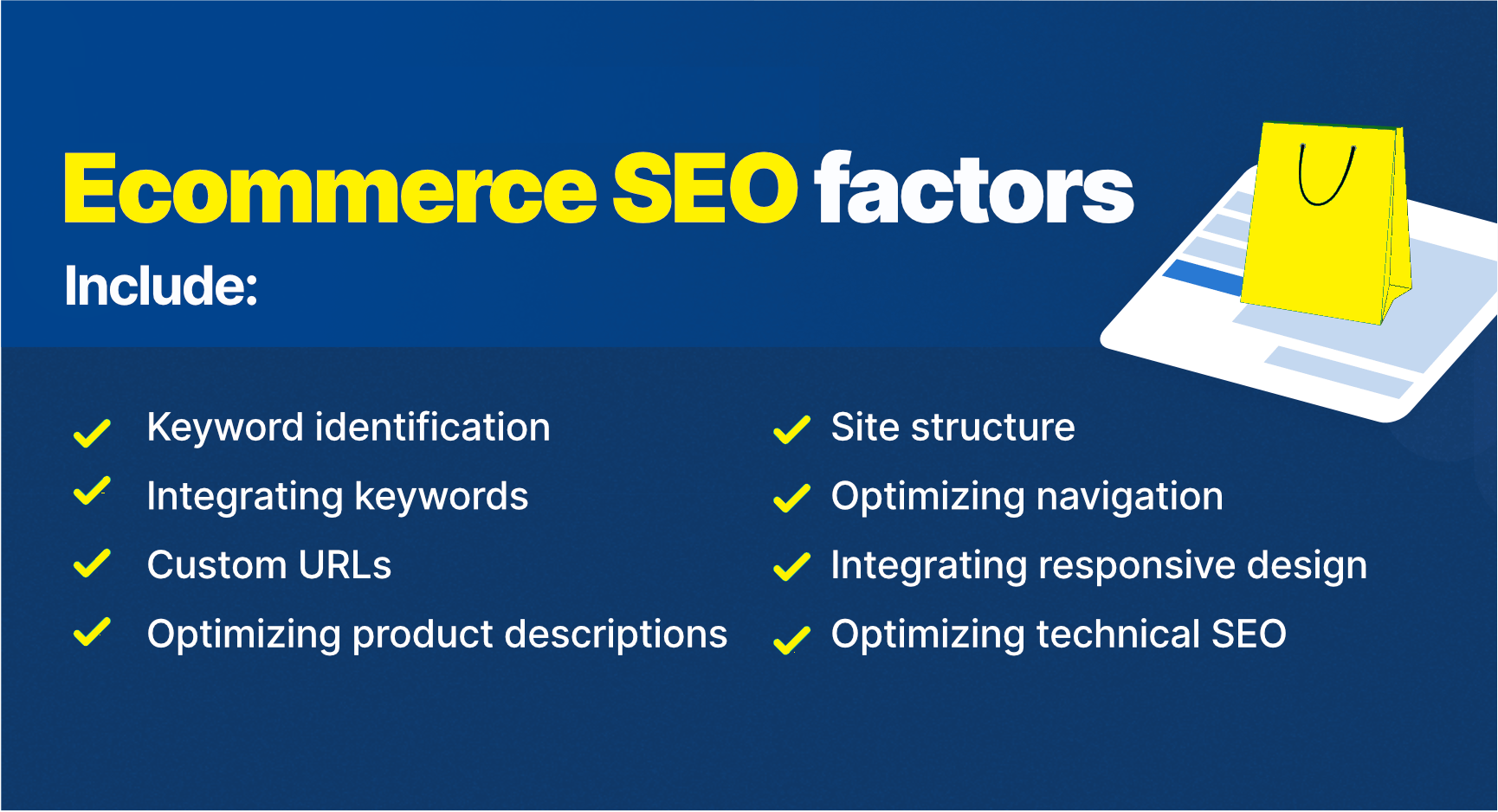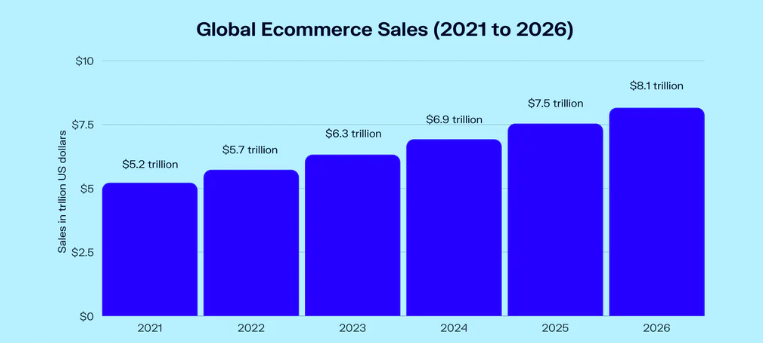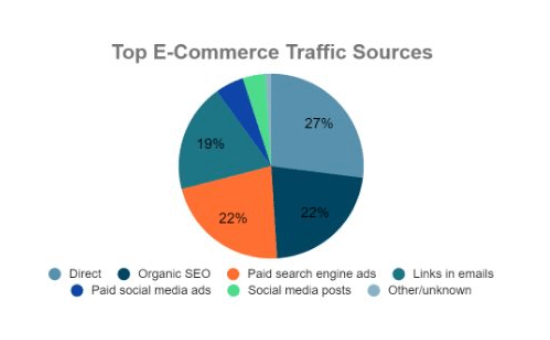Ecommerce digital marketers focus mainly on paid ads and social media for promoting website traffic. A well-structured SEO strategy can help your e-commerce site boost its Google search rankings and drive more traffic to the websites. SEO involves optimizing the website’s content, improving its loading speed, and building high-quality backlinks.
By implementing an effective SEO strategy, ecommerce digital marketers can attract more organic traffic to their website and increase their conversion rates. In this post, we will dive deep into what is Ecommerce SEO and the best strategies you can adopt to get more traffic for your ecommerce store.
Page Contents:
What is Ecommerce SEO?
Ecommerce SEO is a strategy that enables web retailers to rank higher in Google search results. A well-optimized website with high quality content has the likelihood of ranking better in Google search results, resulting in increased visibility and more traffic.
In addition to optimizing the website, ecommerce SEO also involves keyword research, link building, and other techniques to improve the website’s authority and relevance. By implementing these strategies, ecommerce businesses can attract more qualified leads and increase their chances of converting them into customers.
Best strategies for more traffic at ecommerce websites
With millions of ecommerce sites growing each day, it’s difficult to stand out and rise above the competition. One way to differentiate yourself is by providing exceptional customer service, such as fast response times and personalized experiences.
Another strategy is to focus on niche markets or unique products that are not widely available elsewhere. By implementing right practices for ecommerce SEO, you can improve your chances of gaining leads and boosting conversions by following the below steps:
Conduct keyword research to optimize your ecommerce site
Keyword research is the process of carrying out search related to your business niche, industry, products that users are searching online. It is crucial in SEO as it is required to match content with users’ search intent. Understanding buyers’ intent is crucial for targeting the right keywords.
The best way to find out the keywords is analysing search volume, ranking difficulty and organic click-through rate. Once you have identified the keywords, next step is to optimize landing page Meta title, Meta description, header, etc. Keyword research enables Google to better understand the type of products you are selling and provide relevant results to the search queries.
Use long-tail keywords
Long tail keywords have low search volume but are excellent for competitive niches. There are numerous tools available to help you find long-tail keywords. They convert at a higher rate than short-tail keywords because they provide a much more accurate match to what the user is looking for online.
Long-tail keywords are also less expensive to bid on in paid search campaigns, making them a cost-effective option for businesses with limited budgets. Additionally, incorporating long-tail keywords into your content strategy can improve your website’s overall SEO performance and increase organic traffic.
Constructing an SEO-friendly site structure
The hierarchy of pages on your site and how the pages interlink with one another are referred to as site structure. An organised site structure is important for both SEO and providing a great user experience. A well-structured site helps search engines understand the content on your website and rank it accordingly.
Additionally, a clear site structure makes it easier for users to navigate and find the information they are looking for. After you’ve properly structured your site, you’ll need to create an XML sitemap and submit it to Google Search Console.
Create content for your product pages
Google’s algorithms favour websites with a lot of content. Good content attracts visitors and improves your website’s ranking in search engines. Product reviews, targeted keywords, and links to other product categories on the website should all be included in the product page content. Product descriptions and alt image tags must also be included. Avoid creating duplicate content at all costs to avoid being penalised by Google.
Add structured data
Structured data are HTML tags that provide additional information about the content on web pages. Structured data enables Google in categorizing and indexing your page content. It enhances the way search results appear on Google SERPs. Rich snippets with additional details such as rating, reviews, images, and other details get displayed in the Google search results that are much more engaging and appealing for the readers.
Fix Technical SEO issues
Common Technical SEO errors include slow site speed, broken links, duplicate content, 404 errors, incorrect robot.txt file, etc. Technical SEO revolves around improving technical SEO issues on your ecommerce website and helps in creating a faster site with better crawlability and security. Addressing these technical SEO issues can significantly improve the overall user experience and search engine rankings of your ecommerce website, leading to increased traffic and sales. Therefore, it is crucial to regularly monitor and fix any technical SEO errors that may arise.
Link building for Ecommerce
Quality links are essential because they indicate that your site is credible and trustworthy. Link building is an important ranking factor in SEO. You can begin link building by creating internal backlinks, writing guest posts, distributing press releases, distributing white papers and case studies, creating infographics, and much more. These link building techniques are reliable and legal methods of obtaining high-quality links.
Social media sharing
Social media sharing may not directly impact your SEO but expands brand outreach, leading to greater publicity and increased trust. It also impacts your local SEO results, boosts visibility, builds brand recognition, and widens your content reach. Furthermore, social media engagement can also improve your website’s traffic and reduce bounce rates, which are important factors for search engine rankings. It is crucial to maintain an active presence on social media platforms to enhance your overall digital marketing strategy.
Add Sitemap
A sitemap is a graphic representation of your website. It provides a quick summary of the website and an overview of the various pages. It should include information about your website’s pages, product pages, the number of different categories, subcategories, and other content in the sections. You can create a sitemap manually or use an automated tool such as Google Webmaster.
We hope the above described tips are useful in designing an effective strategy for your Ecommerce store. SEO is the perfect solution for getting more organic traffic to your ecommerce website and depend less on paid mediums to boost traffic and visibility.
By optimizing your website for search engines, you can increase your chances of appearing on the first page of search results and attract potential customers who are actively searching for products or services similar to what you offer. This can ultimately lead to higher sales and revenue for your ecommerce business.


